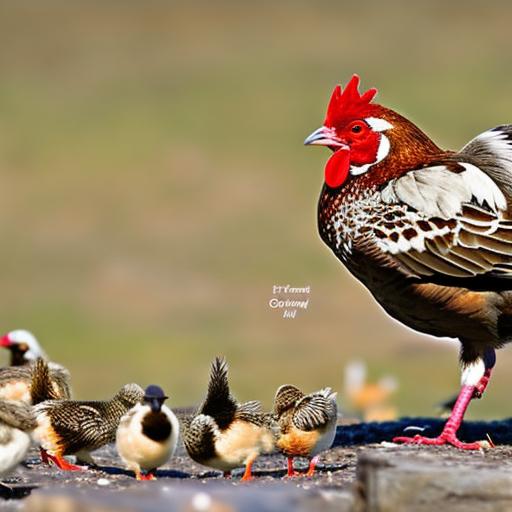Chicken pecking and bullying is a common issue that many poultry owners face. It can be distressing to witness these behaviors in your flock, and it’s important to understand the causes and find solutions to prevent further harm. In this article, we will explore the reasons why chickens peck and bully each other, the importance of proper nutrition and a comfortable living environment, the role of roosters in preventing bullying, the benefits of providing adequate space, how to identify and treat injuries caused by pecking and bullying, managing flock dynamics and social hierarchy, using distractors and enrichment activities to reduce stress, introducing new birds to your flock, and seeking professional help for severe cases. By understanding these factors and taking appropriate action, you can create a harmonious and healthy environment for your chickens.
Key Takeaways
- Chicken pecking and bullying can be caused by overcrowding, boredom, and social hierarchy issues.
- Proper nutrition is crucial for preventing pecking and bullying behavior in chickens.
- A comfortable living environment with adequate space, nesting boxes, and perches can reduce stress and prevent pecking and bullying.
- Roosters can play a role in preventing bullying behavior in a flock.
- Providing adequate space for your flock can reduce stress and prevent pecking and bullying.
Understanding the Causes of Chicken Pecking and Bullying
Chickens peck and bully each other for various reasons. One common cause is boredom or lack of stimulation. Chickens are naturally curious creatures, and if they don’t have enough activities or space to explore, they may turn to pecking at each other out of frustration. Another reason for pecking and bullying is overcrowding. When chickens are crammed into a small space with limited resources, they may become aggressive towards each other in order to establish dominance or access to food and water.
There are different types of pecking and bullying behaviors that can occur within a flock. Feather pecking is when one chicken pulls out the feathers of another chicken. This behavior can be triggered by stress or boredom. Cannibalism is a more severe form of pecking where chickens actually injure or kill each other. This behavior is often a result of overcrowding or nutritional deficiencies. Bullying can also manifest as chasing, cornering, or attacking weaker or smaller chickens. Understanding these behaviors is crucial in order to address the root causes and find appropriate solutions.
The Importance of Proper Nutrition for Your Flock
Proper nutrition plays a vital role in preventing pecking and bullying behaviors in chickens. When chickens are not receiving the right nutrients, they may become more aggressive or exhibit abnormal behaviors. It’s important to provide a balanced diet that includes a mix of grains, protein, vitamins, and minerals. High-quality commercial chicken feed is a good starting point, but it’s also important to supplement their diet with fresh fruits and vegetables, as well as access to insects and worms.
In addition to providing the right nutrients, it’s also important to ensure that your flock has access to clean and fresh water at all times. Dehydration can lead to stress and aggression in chickens. Regularly cleaning and sanitizing their water containers is essential to prevent the spread of diseases and maintain their overall health.
Creating a Comfortable Living Environment for Your Chickens
| Aspect | Metric |
|---|---|
| Space | 4 square feet per chicken in the coop, 10 square feet per chicken in the run |
| Temperature | Between 50-80°F, with proper ventilation to prevent moisture buildup |
| Lighting | 14-16 hours of light per day, with natural light preferred |
| Nesting Boxes | 1 box per 4-5 hens, with soft bedding and privacy |
| Perches | 6-10 inches of perch space per chicken, with rounded edges to prevent foot injuries |
| Food and Water | Access to fresh water and a balanced diet of chicken feed, supplemented with occasional treats |
| Cleanliness | Regular cleaning of coop and run, with proper disposal of waste to prevent odor and disease |
A comfortable and stress-free living environment is crucial for preventing pecking and bullying in chickens. Providing adequate space is one of the key factors in creating a comfortable environment. Overcrowding can lead to increased stress levels and aggression among chickens. As a general rule of thumb, each chicken should have at least 4 square feet of indoor space and 10 square feet of outdoor space. However, it’s important to consider the size and breed of your chickens, as some may require more space than others.
In addition to providing enough space, it’s important to create a suitable living space for your chickens. This includes providing proper ventilation to prevent the buildup of ammonia from their droppings, as well as ensuring that their coop is clean and free from pests. Chickens also need access to natural light, so having windows or skylights in their coop is beneficial. Providing perches and nesting boxes will also give them a sense of security and comfort.
The Role of Roosters in Preventing Bullying and Pecking
Having a rooster in your flock can help prevent bullying and pecking behaviors. Roosters are natural protectors and will often intervene if they see any aggression or bullying within the flock. They will establish themselves as the leader and maintain order among the hens. However, it’s important to note that not all roosters are effective in preventing bullying, and some may even contribute to the problem. It’s crucial to choose a rooster with a calm and gentle temperament to ensure a harmonious flock.
Having a rooster in your flock also has other benefits. They can help fertilize eggs if you’re interested in breeding, and their crowing can act as an alarm system to alert you of any potential threats. However, it’s important to consider the noise factor if you have close neighbors or live in an urban area.
The Benefits of Providing Adequate Space for Your Flock

Providing enough space for your chickens is essential for their overall well-being and can help prevent pecking and bullying behaviors. When chickens are overcrowded, they may become stressed and agitated, leading to increased aggression within the flock. By providing adequate space, you allow them to establish their own territories and reduce the likelihood of conflicts.
To calculate the right amount of space for your flock, you should consider the size and breed of your chickens. As mentioned earlier, a general guideline is to provide at least 4 square feet of indoor space and 10 square feet of outdoor space per chicken. However, it’s important to observe your flock and make adjustments if necessary. If you notice signs of aggression or stress, it may be an indication that they need more space.
Identifying and Treating Injuries Caused by Pecking and Bullying
Pecking and bullying can result in injuries among chickens, so it’s important to be able to identify and treat these injuries promptly. Common signs of injuries include missing feathers, wounds, bleeding, or swollen areas. If you notice any of these signs, it’s important to separate the injured chicken from the rest of the flock to prevent further harm.
To treat minor injuries, you can clean the wound with an antiseptic solution and apply a topical antibiotic ointment. It’s important to keep the wound clean and monitor it for any signs of infection. If the injury is severe or if you’re unsure how to treat it, it’s best to consult a veterinarian for professional advice.
Preventing further injuries caused by pecking and bullying involves addressing the root causes. This may include providing more space, ensuring proper nutrition, and managing flock dynamics. By creating a comfortable and stress-free environment, you can minimize the likelihood of aggression within your flock.
Managing Flock Dynamics and Social Hierarchy
Understanding flock dynamics and social hierarchy is crucial for maintaining a healthy and harmonious flock. Chickens have a natural pecking order, where each chicken has a specific rank within the flock. This social hierarchy helps establish order and reduces aggression among chickens.
It’s important to observe your flock and identify any signs of bullying or aggression. If you notice one chicken consistently being targeted or if there is excessive aggression within the flock, it may be necessary to intervene. One way to manage flock dynamics is by separating the aggressive chicken from the rest of the flock for a period of time. This can help reset the social order and reduce aggression.
Introducing new chickens gradually can also help manage flock dynamics. When introducing new birds, it’s important to quarantine them for a period of time to ensure they are healthy and free from diseases. Once they have been cleared, you can gradually introduce them to the existing flock by allowing them to interact through a wire barrier. This allows them to establish a pecking order without causing harm to each other.
The Use of Distractors and Enrichment Activities to Reduce Stress
Distractors and enrichment activities can help reduce stress and prevent pecking and bullying behaviors in chickens. Providing distractions such as hanging treats or toys can keep chickens occupied and prevent them from turning to pecking at each other out of boredom. Enrichment activities such as scattering food or providing a dust bath area can also stimulate their natural behaviors and reduce stress.
There are various types of distractors and enrichment activities that you can provide for your flock. Hanging a cabbage or other leafy greens can provide entertainment and a healthy snack. Placing a mirror in the coop can give chickens a sense of companionship. Providing perches, logs, or branches for them to climb on can also keep them active and engaged.
Introducing New Birds to Your Flock
Introducing new birds to your flock can be a delicate process, but with proper planning and precautions, you can minimize stress and prevent pecking and bullying. As mentioned earlier, it’s important to quarantine new birds for a period of time to ensure they are healthy and free from diseases. This will also give them time to adjust to their new environment before being introduced to the existing flock.
When introducing new birds, it’s best to do it gradually. Start by allowing them to interact through a wire barrier, such as a separate pen within the coop or a temporary fence. This allows them to establish a pecking order without causing harm to each other. After a period of time, you can gradually remove the barrier and monitor their interactions closely. If any aggression occurs, it may be necessary to separate them again until they have established a more harmonious relationship.
Seeking Professional Help for Severe Cases of Bullying and Pecking
In severe cases of pecking and bullying, it may be necessary to seek professional help. A veterinarian or poultry specialist can provide guidance and advice on how to address the issue. They can help identify any underlying health issues or nutritional deficiencies that may be contributing to the problem. They may also recommend behavioral interventions or medications to help manage aggression and reduce stress in your flock.
It’s important to remember that prevention is key when it comes to pecking and bullying. By addressing the root causes and taking appropriate action, you can create a healthy and harmonious environment for your chickens.
Chicken pecking and bullying can be a distressing issue for poultry owners, but with proper understanding and action, it can be prevented. By providing a comfortable living environment, ensuring proper nutrition, managing flock dynamics, and using distractors and enrichment activities, you can reduce stress and minimize the likelihood of aggression within your flock. It’s important to observe your chickens closely and address any signs of pecking or bullying promptly. Seeking professional help may be necessary in severe cases. By taking these steps, you can create a harmonious and healthy environment for your chickens to thrive.
If you’re looking for tips on how to keep chickens from pecking at each other, you might find this article on “Chicken Coop Interior Ideas” helpful. It provides creative and practical ideas for designing the interior of your chicken coop to promote a peaceful and harmonious environment for your flock. From incorporating perches and roosts at different heights to creating separate feeding and nesting areas, these ideas can help reduce aggression and pecking among chickens. Check out the article here for more details.
FAQs
What causes chickens to peck at each other?
Chickens may peck at each other due to overcrowding, boredom, stress, or a lack of proper nutrition.
How can I prevent chickens from pecking at each other?
You can prevent chickens from pecking at each other by providing enough space, a balanced diet, and environmental enrichment such as perches, dust baths, and toys. You can also trim their beaks or use anti-pecking sprays.
What is cannibalism in chickens?
Cannibalism in chickens is when one chicken pecks at and injures another chicken, leading to the injured chicken being eaten alive by the flock.
What are the signs of cannibalism in chickens?
Signs of cannibalism in chickens include feather pecking, skin wounds, and blood on the feathers or skin of the chickens.
How can I treat cannibalism in chickens?
You can treat cannibalism in chickens by separating the injured chicken from the flock, treating its wounds, and providing a stress-free environment. You can also use anti-pecking sprays or beak trimming to prevent further pecking.
Meet Walter, the feathered-friend fanatic of Florida! Nestled in the sunshine state, Walter struts through life with his feathered companions, clucking his way to happiness. With a coop that’s fancier than a five-star hotel, he’s the Don Juan of the chicken world. When he’s not teaching his hens to do the cha-cha, you’ll find him in a heated debate with his prized rooster, Sir Clucks-a-Lot. Walter’s poultry passion is no yolk; he’s the sunny-side-up guy you never knew you needed in your flock of friends!







